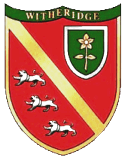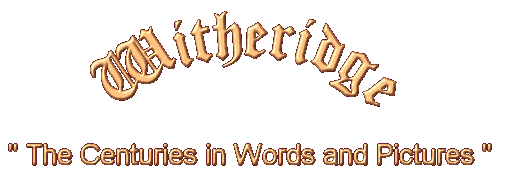

|
Neither Revd Castlehow nor John Benson were able to clarify how the relationship between Witheridge and the Duchy of Lancaster began. The court rolls tell us that, in addition to the manor and hundreds courts, a Duchy of Lancaster court was held in Witheridge from 1396 to 1624. The court continued from there and the last reference occurred in White's Directory of 1850, although no records survive.
1396 : William, Lord Botreaux died on May 25th 1396. In December 1396 the Roll of the Court of the Duchy of Lancaster listed Witheridge as being held by the Duchy with the following entry. Now the whole of the Manor of Witheridge remaining is taken into the hands of the Lord during the minority of the son and heir of William Botreaux.This implies that the Manor of Witheridge came to the House of Lancaster by way of the young heirs grandmother Elizabeth, a descendant of William Brewer. This is the first reference in Lancaster to Witheridge. The connection between Witheridge and the Duchy of Lancaster would therefore appear to derive from the Medial Lordship of the heirs of William Brewer which is to be found in Testa de Nevill, dated 1243. There is no mention of Witheridge in the IPM of William Brewer, nor in the lists of lands which came to his daughters after the death of his son William Brewer the Younger in 1232. However all the estates quoted by H Watkins in his presidential address to the Devonshire Association in 1918 as falling to Margery de Feritate are to be found in the list of Duchy Property. Margery's daughter married a Chatworth and her granddaughter the ultimate heiress married Henry, Duke of Lancaster. Their eldest daughter and heiress married John of Gaunt, Duke of Lancaster. 1755 : The Borough in general enjoys the common privileges of the Duchy of Lancaster. viz: Exemptions from Tolls and customs at markets and fairs etc. A duchy court is kept up here besides the Manor court and the hundred court. The Steward, if I mistake not, has his authority from the King or his Minister as Duke of Lancaster. 1850 : A Court Leet and Baron is held for the Manor Yearly at the Angel Inn, as also is a court of the Duchy of Lancaster. Mr W Croute is steward of the former, and Mr T M Comins of the latter. Here are a few examples of what the Duchy Court had to deal with:-1396 -"The bailiff presents that John Fattecote broke pinfold and said that he led away a horse and was therefore attached". John's horse had strayed and been put in the village pound (pinfold) but John had broken in and taken his horse away, and hence was arrested ("attached"). 1396 -"William Geffray and John Thomas sought of Thomas Shourte on a plea of trespass separately, who is attached for one ox and is distrained".Thomas was not only arrested but his ox was seized and held, to ensure that he paid his fine. 1413 -"William Ellis and the bailiff in mercy because they did not produce John Westlake on the complaint of Thomas Sergey in a plea of debt and let them be distrained".Here the bailiff is in trouble for not doing his job and the court ordered that goods of his be seized to force him to pay his fine. 1413 was a bad year for the Witheridge bailiff, for he was fined on 38 occasions for not doing his job, his fines for the year totalling five shillings and seven pence, a big sum at that time. 1443 - This was another poor year for the bailiff, who often failed to get the accused into court, even though he had the power to, "distrain" them (to force them by seizing their belongings). Here is an example:- "Henry Denys executing the will of Matilda Yeaminstor sought of Roger Hayward in a plea of debt, who did not come and the bailiff did not distrain him, therefore in mercy, let him be distrained". Henry is Matilda's executor and finds that Roger owed her money. Roger does not turn up, and the bailiff is at fault in failing to compel him to do so. 1443 - The clerk of the parish is also in bother. He was Robert Baker, and William Coll and John Salter accused him of trespass. He had not been arrested and the court ordered that he should be. 1555 - Wutherygge Turn of our Lord the King and our Lady the Queen of their Duchy of Lancaster held there the 15th day of October the year above name. "The tithing man came and presented all things well". He was the head of the borough. "The bailiff came there and presented that William Crosse assaulted Stephen Diener, and that Walter Symons sold wine and that Thomas Grenyslade sold cider and they are in mercy". They were "in mercy", so they were guilty and liable. William and Thomas were fined three pence each, but Walter's selling wine was considered more serious and his fine was sixpence. "The free tenants came there and presented all things well". The free tenants were tenants who paid rent only, and were not liable for other services; such as so many days work a year. Among the fifteen names listed are several familiar today, nearly 450 years later: Gibbings, Vicary, Ware, Jordan, Hodge, Mogridge, Symons, Downey, Hooper. 1561-"The bailiff came there and presented that Ralph Hernaman, Richard Forde and Thomas Downey tapped cider by false measure. They are in mercy". They were guilty and fined two pence each. The Rev Castlehow unearthed these lists. They are included here because after over 400 years a number of the names are continuing today, either as family names (Wall, Stevens, Thorne, Oxenham, Vicary, Crooke, Southwood, Partridge), or as house or farm names (Grendon, Thorne, Ford, Mill, Cobley, Lashbrook). A neighbour parish appears in Agneta Thelbrygge (Thelbridge), although there are no Witheridge's. It is strange that in spite of all the efforts of the worldwide Witheridge Family History Society, they have never been able to place any in the place itself, although there is a Witheridge family in the South West today. The "Heritage of Lancaster" referred to by John of Gaunt in his will dates from 1265 when Henry III gave his youngest son, Edmund, lands and possessions following the Barons' War. In 1267 Henry created Edmund the first Earl of Lancaster and gave him the County, Honour and Castle of Lancaster. In 1335, Edward III raised Lancaster to a County Palatine and created Edmund's grandson, Henry Grosmont, first Duke of Lancaster. This gave Henry sovereign rights in the County. The first Duke died without male issue and the inheritance passed to his daughters, Blanche and Maude. By his marriage to Blanche, John of Gaunt, son of Edward III, acquired the inheritance and in 1390, the Palatine was granted to his heirs forever. Following the death of his father, John of Gaunt, in 1399, Henry Bolingbroke returned from exile to secure the Lancaster inheritance from claims by his cousin, Richard II. Richard was deposed and Bolingbroke was later crowned Henry IV After his coronation, Henry decreed that the Duchy inheritance should remain separate from all other Crown holdings to be enjoyed by his heirs and successors. It has remained so to the present day. Previous Last Edited 03/07/2006 Copyright © 2000-2006 Witheridge Unless otherwise indicated on the page in question, the photographic images reproduced on this site belong to the Witheridge Archives, and, as such may not be reproduced for commercial purposes without written permission. However, you are welcome to use any of the photographs belonging to the archive for personal and/or non-commercial use. Any material shown as not being owned by the archive may not be reproduced in any form without first receiving written permission from the owner of the material in question. The illustration of the Duchy Flag is reproduced with kind permisasion of the Duchy of LAncaster. |


